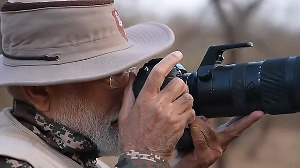On August 11, as usual, students of the Pandithurai Corporation Boys Higher Secondary School in Madurai were sitting in the lawn and studying under a neem tree.
But the activity in the science lab was not usual. It was being cleaned and spruced up. The reason wasn't a visit by the officials of the education department.
It was an AIDS awareness camp being held by the Centre for Rehabilitation of Infants and Females (CRIF)
Two girls from CRIF conducted the camp. Munishree did all the talking, while Selvi handled the projector for the slide show.
The students who listened to them were from the 10th 11th and 12th standards. Most of them were aware that the dreaded disease spread through unprotected sex.
But not many were aware of how the virus caused such devastation. The students listened in rapt attention as the first slide showed how the virus enters the White Blood Corpuscles. The girls from CRIF explained that the HIV, which has Ribonucleic Acid (RNA), first enters the T cells.
One it enters the T-cells, it changes its RNA to Deoxy Ribonucleic Acid (DNA) and fools the WBC, which allows it to enter. Once it enters the nucleus of the cell it returns to its RNA form and starts multiplying.
These rapidly multiplying cells break out of the WBC and start attacking the other WBCs. Once the number of WBCs decrease in the body, resistance to diseases crumbles and the patient becomes susceptible to various ailments.
The HIV spreads through unprotected sex, syringes, mother to foetus, blood transfusion, tatooing, shaving, ear and nose piercing.
Mosquito bites, though, cannot the spread the virus as the nozzle of the insect is smaller than the virus. The virus also cannot spread through touch, through the air or by kissing.
But the CRIF explained that if there is an ulcer in the alimentary canal of an HIV infected person, then his/her saliva will contain the virus. In such cases, the virus can spread through kissing.
AIDS can also spread through oral sex as the semen is infected. To the surprise of many the CRIF revealed that the spread of HIV from mother to the foetus can be stopped with injections that are easily available.
The Elisa Test is the cheapest AIDS test in the market. The Western Blot Test costs Rs 2000. There is a RT PCR Test too, which costs Rs 6000.
Common diseases like cold, fever last longer in AIDS patients. Some of the early symptons are unexplained loss of weight and tiredness.
One of the slides showed that 50% of AIDS patients die of Tuberculosis. When the T-cell count reaches 200 or below in a person, one can say that he/she has AIDS. When the count is above 200 the patient is called HIV+.
In the session that lasted a little over two hours, CRIF also demonstrated the use of condoms.






 © 2025
© 2025